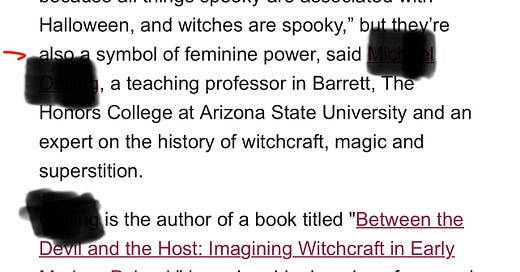Once again, ASU is featuring the benefits of witchcraft. The adherents of Critical Race Theory and its variations tell us to look both at who is given a voice and who is kept silent. ASU featuring this claim tells us clearly what ASU values. Will you listen?
Here, the claim is that witchcraft is good for women because it is a symbol of power. Why? Believing false things about the world is never good for a person. Attaining power based on falsehoods is never good. Is the claim that witchcraft teaches us the truth about the world? That’s one way to understand what is being said.
Or, is there agreement that witchcraft is completely mistaken about the world but that what matters is how it opposes Christianity? The idea then must be that while Christianity is false, and although witchcraft is also false, witchcraft promotes the role of women better than does Christianity. That claim is demonstrably false. Although a person might isolate a given time and say at that time women were more persecuted, the big picture is that Christian Civilization is the one that empowered more women than any other. It is the one that got us to where we are today in women’s rights. Those societies governed by witchcraft either approved of very heinous practices or they rode along with the larger Christian society.
The view that says although witchcraft teaches false things about the world but it is empowering to women, is incredibly insulting to women (and I doubt that this instructor can even define “woman”). Women, as well as men, have minds designed to know the truth. To suggest that somehow women are different than men in that they benefit from falsehood is dehumanizing to all women. Why does ASU feature this view and no completing view?
The other option is that this instructor and those who support him at ASU believe witchcraft teaches truths about the world. Those who engage in casting spells and occult rituals generally do so because they believe these reflect reality. The “occult” means the hidden or what is done in secret.
So the dilemma they face is: either witchcraft teaches falsehoods about the world and is harmful to all thinkers, male or female, or it teaches truths about the world and should be openly taught to all thinkers as the correct way to understand the world.
By featuring claims that witchcraft benefits women, ASU appears to be taking a side of that dilemma (especially since Christian views aren’t featured) unless it publicly corrects this impression. Will it do so?
Parents and students, this is what is promoted as good scholarship at ASU and more specifically at ASU’s Honors College. When you consider where to send your children or attend yourself, believe what they tell you. You will be taught about the benefits of witchcraft. But you won’t be taught about the benefits of Christianity. The claim is, “this is a secular university we don’t promote a specific religion like Christianity,” but featuring these claims about witchcraft is just fine 😂.
[although this article is publicly available on ASU’s webpage, I blocked out the instructor’s name in keeping with my policy to avoid naming people. Stay focused on ideas and never harass a person]





As you know, I’ve been asking for a public debate on the issues I write about but no ASU professor will do so. They will attack me from anonymous accounts however.
I did receive an email from the instructor featured by ASU above. In the past he has emailed me accusing me of misrepresenting him. He cc’d our Provost and his Dean. I pointed out that my post did not say what he claims it did and he had to issue an apology to me in front of both of them (by email). So he is lying when he says I’ve misrepresented him before. He’s the one who had to apologize for that and I can post my email as well as his as proof.
In his email today, he says I misrepresented his work on witchcraft which is about how women condemned as witches in Poland were tortured and he studies their confessions. And then also that he studies how modern feminists used witchcraft as a symbol of power. I didn’t get into his research in the post but both of those things are perfectly consistent with what I wrote.
1. My post is about what ASU does and not does feature as a way of determining what ASU values. In that sense it isn’t even about him.
2. I am directly quoting what ASU’s news article said about witchcraft and power. I am not engaging with his other publications.
3. His point about modern feminists using witchcraft to gain power proves my point and they face the dilemma I proposed.